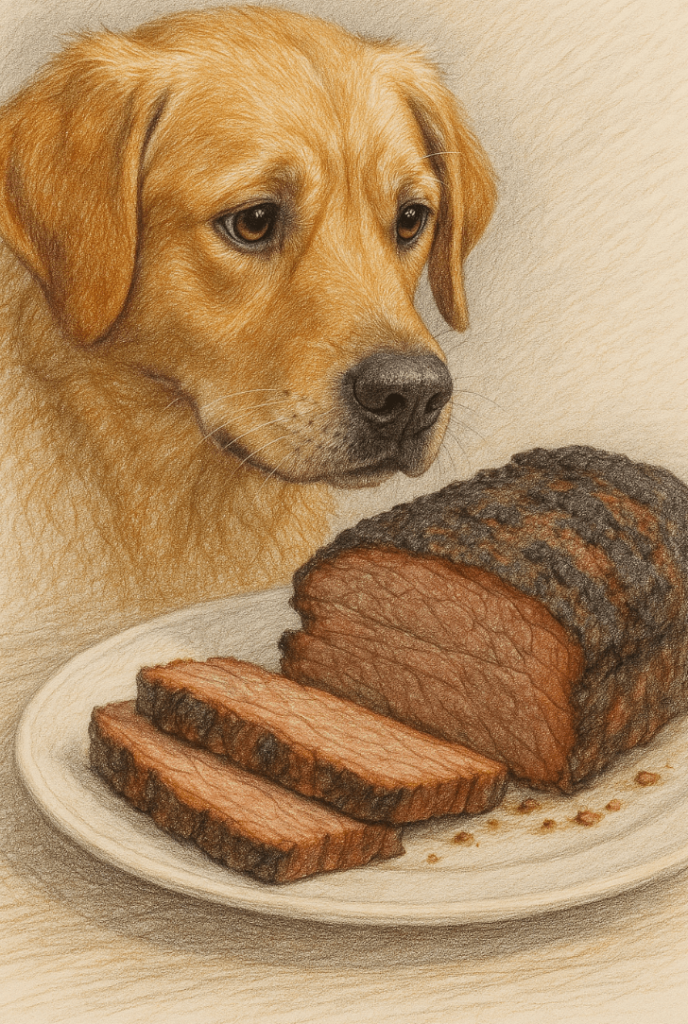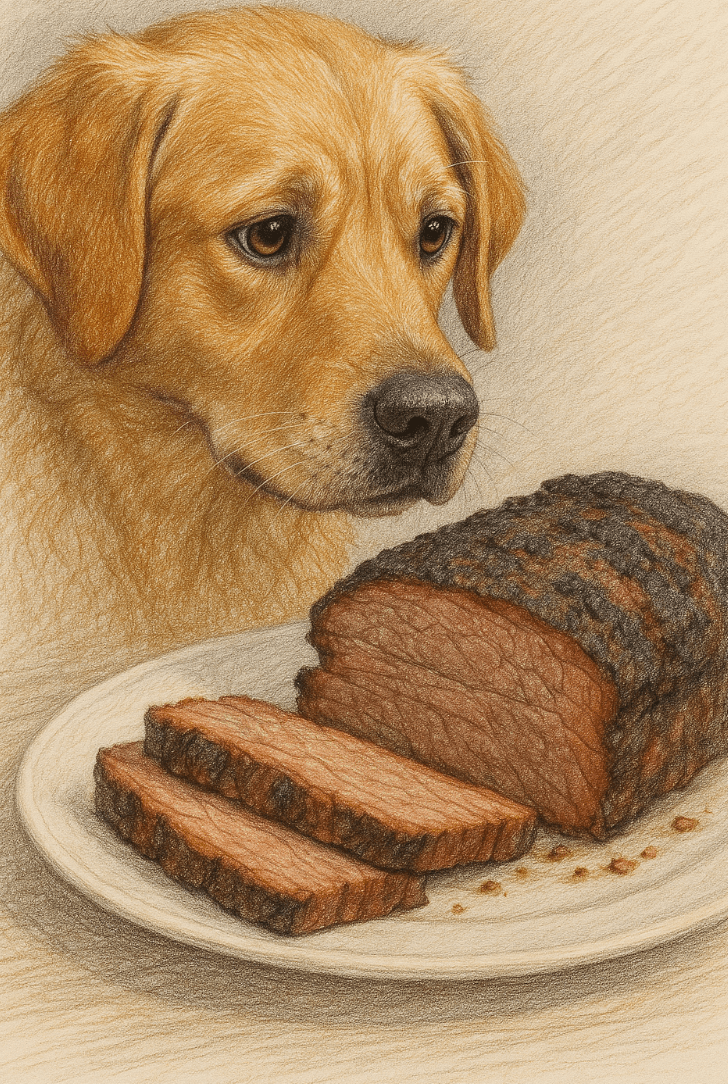Can Dogs Eat Brisket?
Brisket, a flavorful and tender cut of beef often enjoyed by humans, might seem like a tempting treat to share with your furry friend. After all, dogs are known to love meat, and brisket certainly fits the bill. However, before tossing a piece of brisket to your pup, it’s important to consider whether this food is safe, nutritious, and appropriate for their diet. While dogs can eat certain types of meat, not all preparations are suitable for canine consumption. In this blog post, we’ll explore everything you need to know about feeding brisket to dogs, including potential risks, benefits, and safer alternatives.
Potential Risks of Feeding Brisket to Dogs
While brisket itself isn’t inherently toxic to dogs, there are several risks associated with feeding it, especially if it’s prepared in a way that’s unsuitable for canine digestion. Here’s what you should watch out for:
High Fat Content:
Brisket is naturally high in fat, which can upset your dog’s stomach or lead to pancreatitis, a painful and potentially life-threatening condition.Seasonings and Spices:
Many brisket recipes include garlic, onions, or other seasonings that are toxic to dogs and can cause gastrointestinal distress or anemia.Bones and Cartilage:
Cooked bones from brisket can splinter and cause choking hazards, intestinal blockages, or damage to your dog’s digestive tract.Sodium Levels:
Brisket is often seasoned with salt or brined, which can lead to excessive sodium intake and dehydration in dogs.Cooking Methods:
Grilling, smoking, or barbecuing brisket often involves oils, sauces, or marinades that are unhealthy for dogs and can irritate their digestive system.
These risks highlight why caution is essential when considering sharing brisket with your dog. Always prioritize their health over indulgence.
Benefits of Brisket for Dogs (When Prepared Safely)
When prepared correctly, brisket can offer some nutritional benefits for dogs. Lean, unseasoned brisket provides protein and essential nutrients that support their overall health.
High-Quality Protein:
Protein is crucial for muscle development, tissue repair, and maintaining energy levels in active dogs.Essential Amino Acids:
Beef contains amino acids like taurine and carnitine, which are beneficial for heart health and metabolism.Iron-Rich Meat:
Brisket is a good source of iron, which supports red blood cell production and prevents anemia.Low Carbohydrates:
Unlike many processed dog treats, plain brisket doesn’t contain unnecessary carbs or fillers, making it a cleaner option.Palatability:
Most dogs enjoy the taste of beef, making it a great way to entice picky eaters to consume their meals.
While these benefits exist, they must be weighed against the potential dangers of improper preparation.
Check this guide 👉Can Dogs Eat Mackerel? Best 7 Expert Tips!
Check this guide 👉Can Dogs Eat Pastrami? Best 7 Expert Tips!
Check this guide 👉Can Dogs Eat Gelatin? Best 7 Expert Tips!

Safe Ways to Feed Brisket to Dogs | Risks of Unsafe Brisket Preparation |
|---|---|
Plain, boiled brisket (no seasoning) | Seasoned brisket with garlic/onions |
Lean cuts with visible fat removed | Brisket cooked with bones or cartilage |
Small, bite-sized pieces as treats | High-sodium or smoked brisket |
Mixed with dog-safe vegetables | Brisket with BBQ sauce or marinades |
Occasional treat, not a regular diet | Overfeeding leading to obesity |
How to Safely Prepare Brisket for Your Dog
If you decide to feed brisket to your dog, it’s crucial to prepare it in a way that minimizes risks and maximizes safety. Follow these guidelines to ensure a healthy experience.
Choose Lean Cuts:
Opt for lean portions of brisket and trim off any excess fat to reduce the risk of pancreatitis.Avoid Seasonings:
Skip spices, herbs, and sauces entirely—plain brisket is the safest option for your dog.Cook Thoroughly:
Boil or bake the brisket without adding oils, butter, or marinades to keep it simple and digestible.Cut Into Small Pieces:
Serve brisket in small, manageable chunks to prevent choking and make it easier to digest.Limit Portion Sizes:
Treat brisket as an occasional snack rather than a meal replacement to avoid overfeeding.
By following these steps, you can offer brisket as a safe and enjoyable treat for your dog.
Signs Your Dog May Be Struggling with Brisket Consumption
Even with precautions, complications can arise if your dog consumes improperly prepared brisket. Watch for these warning signs to act quickly if something goes wrong.
Vomiting or Diarrhea:
These symptoms may indicate digestive upset caused by fatty or seasoned brisket.Lethargy or Weakness:
A sudden lack of energy could signal pancreatitis or another serious issue related to high-fat foods.Excessive Drooling:
Drooling might suggest nausea or irritation from spices or seasonings in the brisket.Abdominal Pain:
If your dog whines or seems uncomfortable when touched around the belly, consult your vet immediately.Difficulty Breathing:
Choking or respiratory distress could occur if bone fragments or large pieces obstruct their airway.
Recognizing these signs early allows you to seek veterinary care promptly, preventing further complications.
Common Mistakes to Avoid When Feeding Brisket to Dogs
Feeding brisket to your dog requires careful consideration to avoid mistakes that could endanger their health. Here are some pitfalls to watch out for.
Offering Fatty Pieces:
Feeding fatty portions increases the risk of pancreatitis, a serious and painful condition.Using Store-Bought Sauces:
BBQ sauces and marinades often contain sugar, salt, and spices that are harmful to dogs.Ignoring Portion Control:
Overfeeding brisket can lead to weight gain and imbalance in your dog’s diet.Leaving Bones in the Meat:
Cooked brisket bones can splinter and cause choking or internal injuries.Neglecting Allergies or Sensitivities:
Some dogs may have allergies or intolerances to beef; monitor their reaction after feeding.
Avoiding these mistakes ensures a safer and healthier experience for your dog.
Alternatives to Brisket for Dogs
If brisket seems too risky or complicated to prepare, there are plenty of safer alternatives that provide similar nutritional benefits.
Plain Chicken or Turkey:
Cooked, unseasoned poultry is a lean and protein-rich option that most dogs love.Ground Beef (Lean):
Ground beef is easier to portion and can be cooked without added fats or seasonings.Dog-Friendly Vegetables:
Pair proteins with dog-safe veggies like carrots, green beans, or sweet potatoes for added nutrition.Commercial Dog Treats:
High-quality, grain-free dog treats are specifically formulated to meet your dog’s dietary needs.Homemade Dog Food Recipes:
Create balanced meals at home using vet-approved ingredients tailored to your dog’s preferences.
These alternatives allow you to cater to your dog’s cravings while keeping them safe.
Understanding Your Dog’s Nutritional Needs
Dogs have specific dietary requirements that must be met to maintain their health and happiness. Understanding these needs helps you make informed decisions about treats like brisket.
Protein Requirements:
Dogs thrive on diets rich in animal-based proteins, which support muscle growth and energy.Fat Moderation:
While fats are necessary for energy, excessive amounts can lead to obesity and health issues.Carbohydrate Limits:
Dogs don’t require large amounts of carbs, so focus on protein and healthy fats instead.Hydration Importance:
Ensure your dog stays hydrated, especially if consuming salty or processed foods like brisket.Balanced Diet Focus:
Treats like brisket should complement—not replace—a balanced diet designed for long-term health.
By aligning your dog’s diet with their nutritional needs, you can ensure they stay healthy and happy.
Frequently Asked Questions About Feeding Brisket to Dogs
Can I give my dog smoked brisket?
No, smoked brisket often contains harmful additives, high sodium levels, and fats that can harm your dog.
What part of the brisket is safest for dogs?
The lean flat portion, free of fat and connective tissue, is the safest choice for dogs.
How much brisket can I feed my dog?
Limit brisket to small portions, no more than 10% of their daily caloric intake, and serve it occasionally.
Are brisket bones safe for dogs?
No, cooked brisket bones can splinter and cause injuries; always avoid giving bones to your dog.
What should I do if my dog eats seasoned brisket?
Monitor them closely for symptoms of illness, and contact your veterinarian if you notice any adverse reactions.
Prioritizing Your Dog’s Health When Feeding Brisket
Feeding brisket to your dog can be a safe and enjoyable experience if done responsibly. While this cut of meat offers nutritional benefits, improper preparation can pose significant risks to your pet’s health. By understanding the dos and don’ts of feeding brisket, choosing lean cuts, and avoiding harmful seasonings, you can provide your dog with a tasty treat while keeping them safe. Remember, moderation and mindfulness are key—your dog’s well-being should always come first.
Do Cats Have Taste Buds? Best 7 Expert Tips! – Discover how cats experience flavors and why their taste is so unique.
Do Dogs Have Taste Buds? Best 7 Expert Tips! – Discover how dogs experience taste, their preferences, and what it means for their diet and health.
Can Cats Taste Sweet? Best 7 Expert Tips! – Discover why cats can’t taste sweetness, how it affects their diet, and tips to keep them healthy and happy.
Can Dogs Taste Sweet? Best 7 Expert Tips! – Discover how dogs perceive sweetness, which foods are safe, and tips to manage their sweet cravings responsibly.





